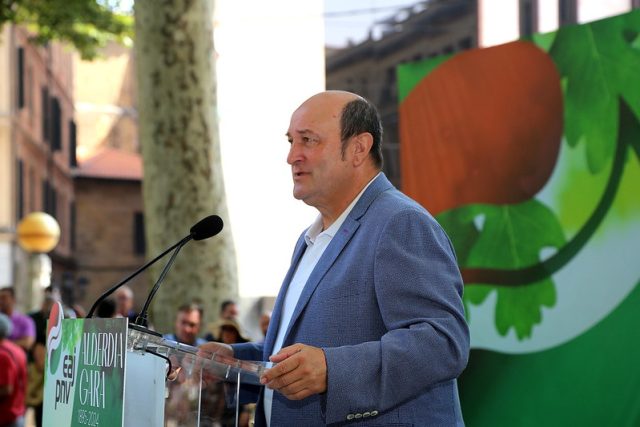
Alderdi Eguna, meaning “Party Day” in Basque, is a significant annual event for the Basque Nationalist Party (PNV) celebrated in the Basque Country. This gathering brings together party members, supporters, and the public to commemorate the history, values, and identity of the PNV, a party rooted in Basque nationalism. More than just a festive occasion, Alderdi Eguna serves as a platform for party leaders to address ongoing political issues and future challenges, providing a space for dialogue and reflection on Basque identity and regional politics.
Against the backdrop of recent events involving their Catalan counterparts, the PNV’s festivities were highly anticipated by the political scene. In Catalonia, nationalist and pro-independence parties supported the actions of citizens who took to the streets during a referendum that, according to Spanish law, was illegal. Subsequent trials confirmed the referendum’s illegality and led to the prosecution of its leaders.
Given these developments, it is not surprising that Basque nationalists, with their long history in nationalist politics, decided to align themselves with Catalan pro-independence forces. They have observed how these groups have managed to gain increased autonomy by challenging state powers, such as gaining control over social welfare policies like the minimum income and securing a new Catalan economic agreement that provides more economic independence.
The presence of Catalan pro-independence leaders at the Basque event further highlights the growing political closeness between these groups.
In the heart of the Basque Country, an autonomous community within Spain, Andoni Ortuzar, the president of the Basque Nationalist Party, made assertive statements that were met with enthusiastic applause from supporters. However, these remarks were also reported in the national press as posing a new challenge to the Spanish government’s president.
A central issue discussed was the proposed reform of the Guernica Statute, the legal framework that defines the powers shared between the central Spanish government and the Basque government. The PNV is particularly focused on incorporating the “right to decide” into this statute, a move that would emphasize the region’s desire for self-determination.
Furthermore, just two days prior to Alderdi Eguna, the PNV and EH Bildu—a party historically linked to the separatist group ETA—joined forces in the regional parliament to pass two motions. These motions called for national recognition and a bilateral relationship with the Spanish state, highlighting the Basque region’s desire for greater autonomy.
Nevertheless, the PNV faces a significant challenge as it continues its nationalist agenda. On one side, the Spanish Socialist Workers’ Party (PSOE) governs Spain. However, the PSOE has also been instrumental in supporting the PNV, allowing them to maintain control of the Basque government for another term. This creates a complicated political landscape for the PNV, as they must carefully balance their discourse to retain the support of the Basque branch of the Socialist Party, thus securing their political dominance in the region. While nationalism inherently seeks increased autonomy from the central authority—in this case, the Spanish state—the PNV must navigate these ambitions delicately.
Despite these challenges, Andoni Ortuzar emphasized during the event that the Spanish government, led by Pedro Sánchez, relies on the PNV’s votes in the Spanish Congress in Madrid to pass crucial legislation and regulations needed for the country’s functioning. This dependence gives the PNV leverage, and they are unafraid to use it to demand more powers and autonomy for the Basque Country.
Ultimately, Pedro Sánchez faces a new challenge similar to that posed by the Catalan nationalists. The Basque Nationalist Party is pushing for more regional powers, less external influence from Catalonia, and a model that, while benefiting the Basque Country, might lead to frustration among other regions in Spain that desire a unified, strong central government. The pressure is now on Sánchez to navigate these tensions, finding a balance between accommodating regional demands and maintaining national unity.



 Subscribe
Subscribe